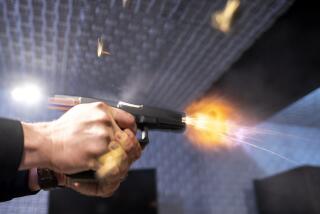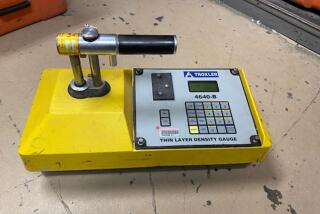Business : Metal Detector Sales Rise With Crime : Security: Use of the devices has increased at nightclubs and even private parties. Their presence alone serves as a deterrent to handguns, one vendor says.
- Share via
Stephen Ryland’s Pasadena shop caters to amateur miners, offering racks of coin detectors, sluices and maps to part-time prospectors who spend their weekends hunting buried treasure and soft nuggets of gold.
Recently, though, business has picked up for devices that detect a different kind of metal: the hard steel of handguns and assault weapons.
The metal detector used at the party in San Marino where two teen-agers were killed June 5 was there as a novelty, party-goers said, to provide a kick. But sales of the devices are serious business--a booming business.
Ryland, who also has sold security equipment for 10 years at his shop, Cal-Gold Enterprises, saw sales of the devices double in the late 1980s. Last year he said he sold 25 to 30 hand-held metal detectors, mainly to local clubs and concert venues, although he declined to name any specifically. Since January, he has sold twice that many, he said.
Until only a few years ago, he said, metal detectors were used primarily at airports, political conventions, the Olympics and some rap shows. Now they’re standard equipment at nightclubs, card clubs, many schools and almost all major concerts.
Metal detectors come in two varieties. The walk-through kind retail at $3,000 to $4,500, and hand-held devices cost $120 to $230. The type and number of devices used depend on what kind of club is using them.
“If it’s a supper club in Pasadena, they may not have any,” he said. “If it’s a place in South-Central, they may have two or three.”
The devices play both a pragmatic and psychological role in preventing weapon use.
“The philosophy is that metal detectors exist as much as a deterrent as they do as a true detector,” Ryland said.
Ryland said that he has sold one or two of the devices for use at private parties, but that’s rare. He warns that in amateur hands they can create a false sense of security.
“If you don’t have a reasonably well-trained person (using them), they may not help,” he said. “Sure they work. But what if you find something? After you do the detection you have to have people trained to follow up. . . . That’s why the deterrent effect is good, because it keeps them from even having that confrontation.”
More to Read
Inside the business of entertainment
The Wide Shot brings you news, analysis and insights on everything from streaming wars to production — and what it all means for the future.
You may occasionally receive promotional content from the Los Angeles Times.










